Environment Variables
dFlow allows you to create and manage environment variables for your services.
Supported Types
-
Static values – set fixed values that remain the same across deployments.
-
Dynamic reference variables – link values to other resources or services.
-
Functions – refresh sensitive values like secret keys.
-
Combine multiple reference values – construct complex variables by joining multiple references and/or static parts
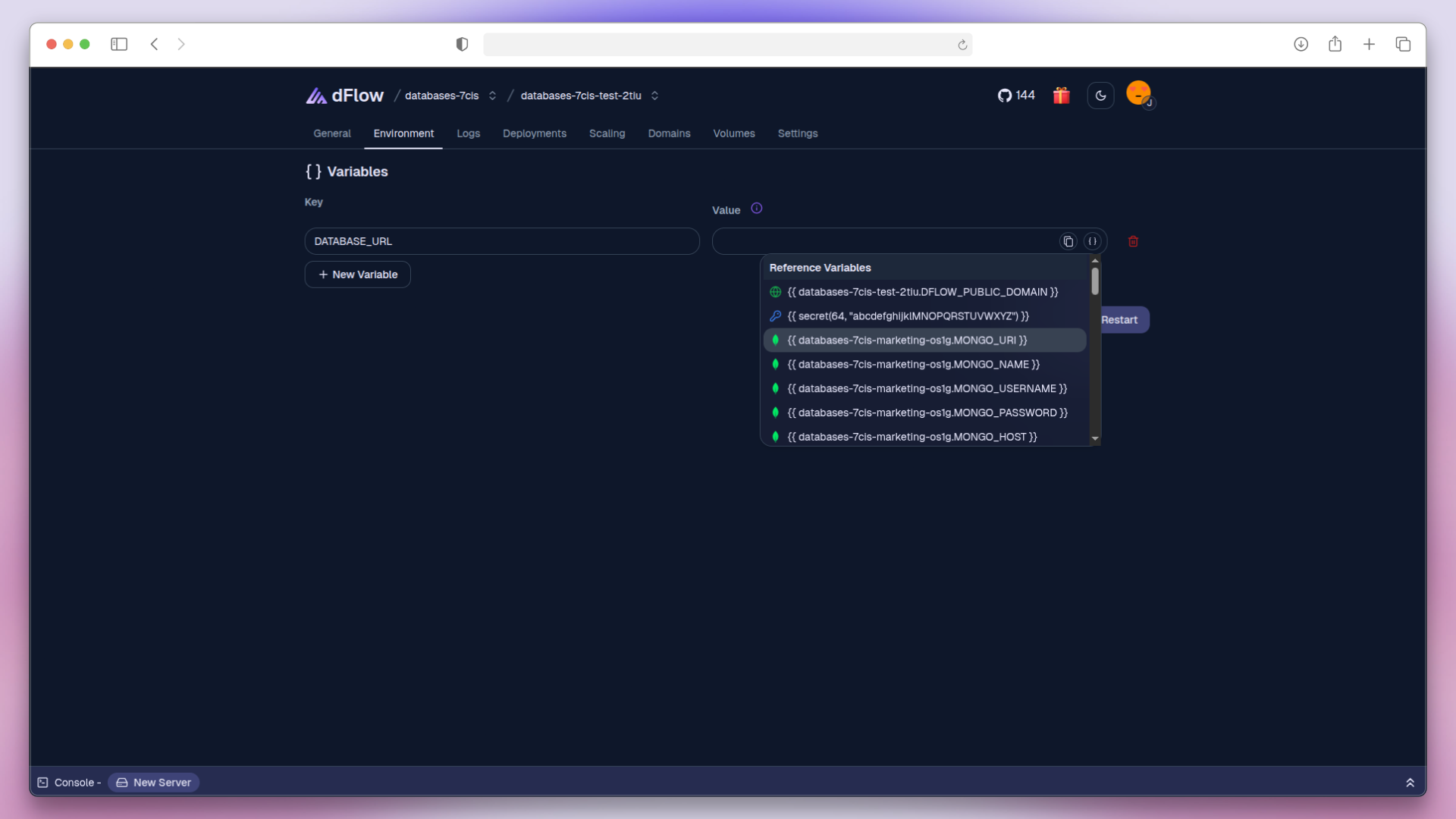
Static values
Set fixed values that remain the same across deployments.
For example:
STRIPE_SECRET_KEY=sk_test_51HxxxxxxEXAMPLE
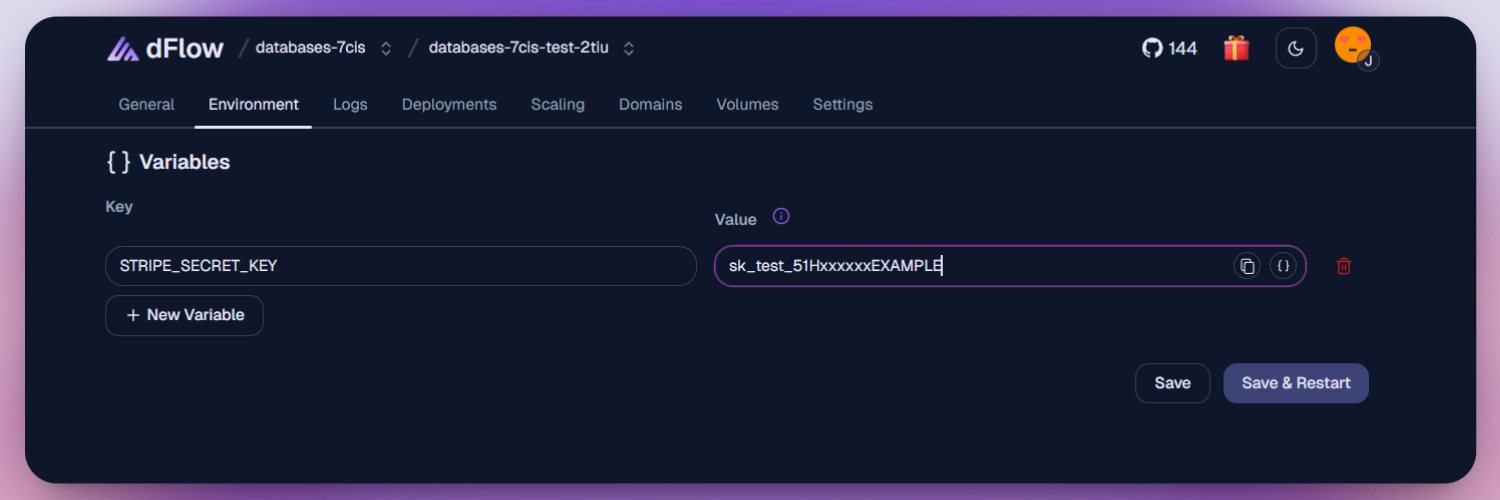
Dynamic reference variables
Dynamic reference variables allow you to link an environment variable directly to values from other services or resources, ensuring that the value updates automatically if the linked service changes.
For example:
MONGO_URI={{ databases-7cis-marketing-os1g.MONGO_URI }}
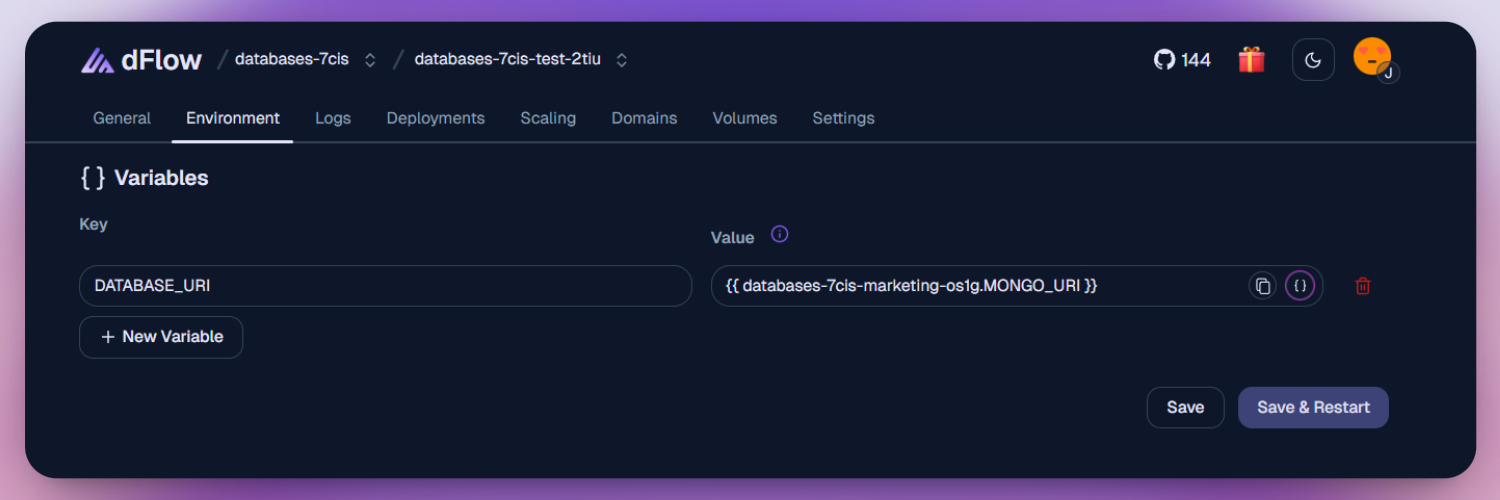
Functions
Use secret() to create random secrets on the fly.
Format
- length – Number of characters (e.g., 32, 64)
- charset – Allowed characters (e.g., "abcABC123", "aA1!")
For example:
PAYLOAD-SECRET={{ secret(64, "abcdefghijklMNOPQRSTUVWXYZ") }}
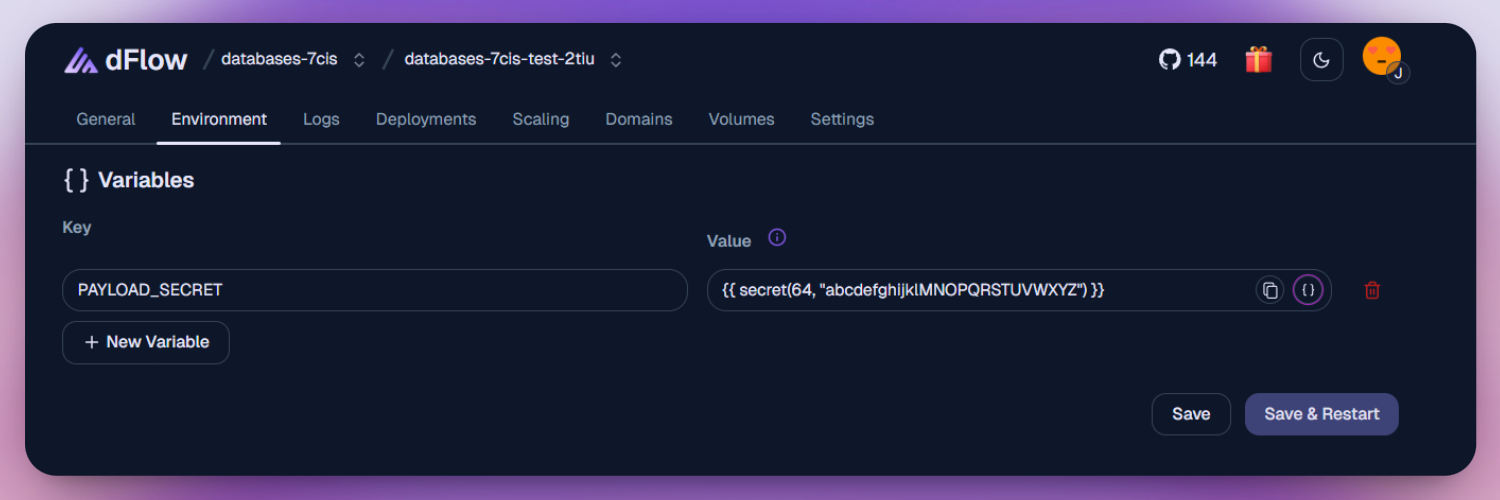
Combine multiple reference values
You can create a single environment variable by combining static values, dynamic references, or secrets. This helps build connection strings or keys without hardcoding sensitive data.
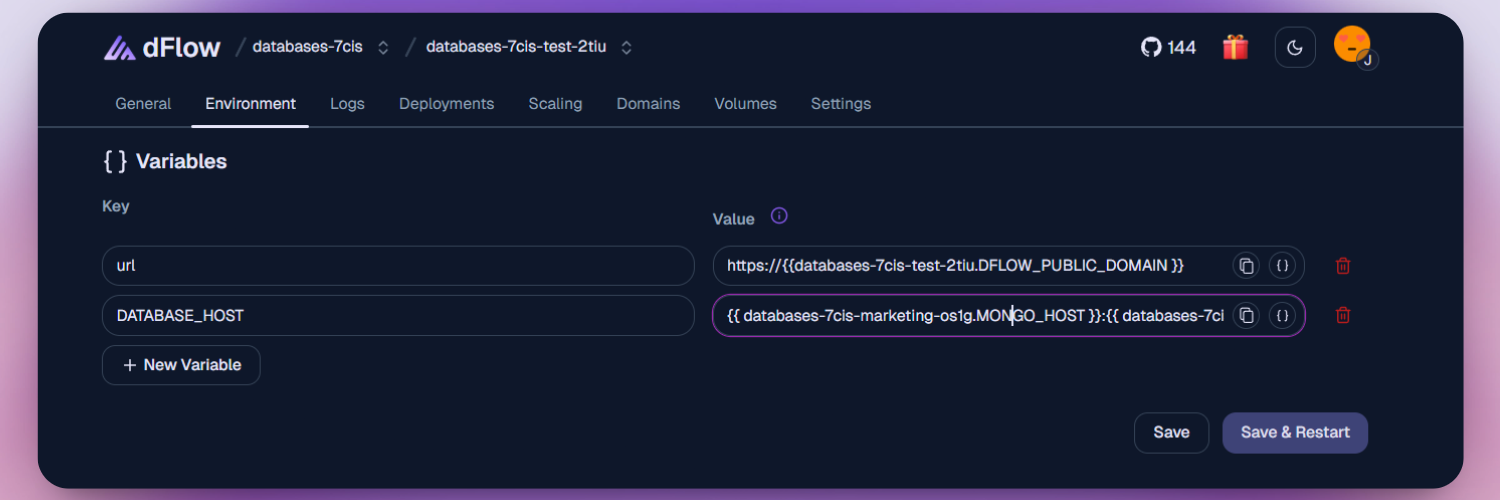
For example:
url= https://{{databases-7cis-test-2tiu.DFLOW_PUBLIC_DOMAIN }}DATABASE_HOST={{ databases-7cis-marketing-os1g.MONGO_HOST }}:{{ databases-7cis-marketing-os1g.MONGO_PORT }}
Database Connection References
The following reference variables are available for all database services.
Private reference values
| Database | Reference Variables |
|---|---|
| MongoDB | MONGO_URI, MONGO_HOST, MONGO_PORT, MONGO_USERNAME, MONGO_PASSWORD, MONGO_NAME |
| PostgreSQL | POSTGRES_URI, POSTGRES_HOST, POSTGRES_PORT, POSTGRES_USERNAME, POSTGRES_PASSWORD, POSTGRES_NAME |
| MySQL | MYSQL_URI, MYSQL_HOST, MYSQL_PORT, MYSQL_USERNAME, MYSQL_PASSWORD, MYSQL_NAME |
| MariaDB | MARIA_URI, MARIA_HOST, MARIA_PORT, MARIA_USERNAME, MARIA_PASSWORD, MARIA_NAME |
| Redis | REDIS_URI, REDIS_HOST, REDIS_PORT, REDIS_USERNAME, REDIS_PASSWORD, REDIS_NAME |
Public reference values
| Database | Reference Variables |
|---|---|
| MongoDB | MONGO_PUBLIC_URL, MONGO_PUBLIC_HOST, MONGO_PUBLIC_PORT |
| PostgreSQL | POSTGRES_PUBLIC_URL, POSTGRES_PUBLIC_HOST, POSTGRES_PUBLIC_PORT |
| MySQL | MYSQL_PUBLIC_URL, MYSQL_PUBLIC_HOST, MYSQL_PUBLIC_PORT |
| MariaDB | MARIA_PUBLIC_URL, MARIA_PUBLIC_HOST, MARIA_PUBLIC_PORT |
| Redis | REDIS_PUBLIC_URL, REDIS_PUBLIC_HOST, REDIS_PUBLIC_PORT |
How to Expose
To get these variables, go to the Generate tab and click Expose on the database service you want to make public.
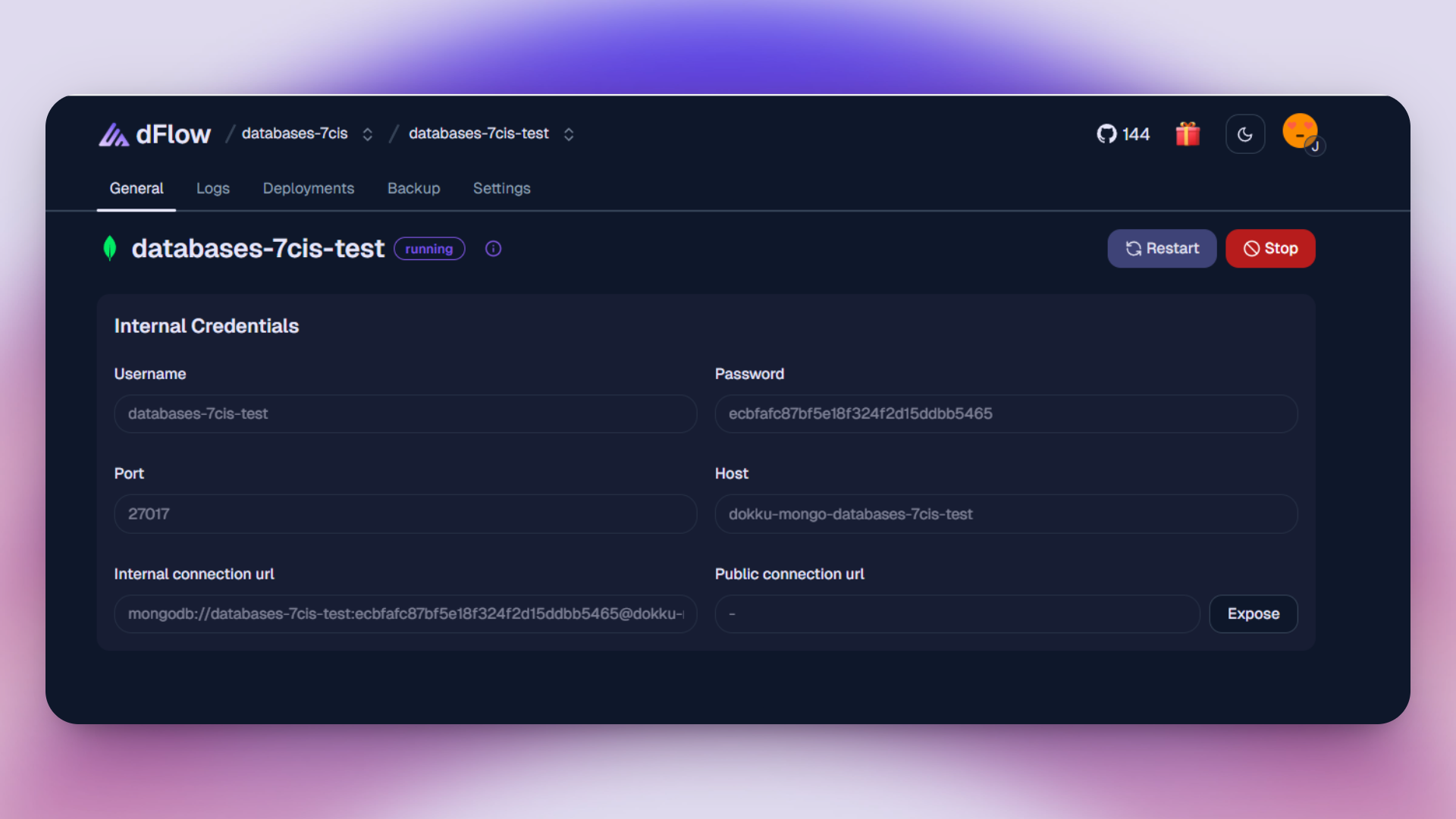
These variables can be referenced dynamically in your configuration using the syntax
{{ service-name.VARIABLE_NAME }}. For example:
{{ databases-7cis-marketing-os1g.MONGO_HOST }}:{{ databases-7cis-marketing-os1g.MONGO_PORT }}
Best Practices
- Prefer reference variables – avoid hardcoding secrets or URLs in configurations.
- Use
secret()for secure random values – generate strong, unpredictable secrets. - Redeploy or restart after changes – ensure updated variables take effect.
- Maintain consistent naming – make variable references easy to understand and manage.
- Keep secrets out of code and VCS – never commit sensitive values to version control.
Environment Variable Limitations
Currently, environment variables can only be configured for services of type Docker and App. Adding new variables for database services is not supported.